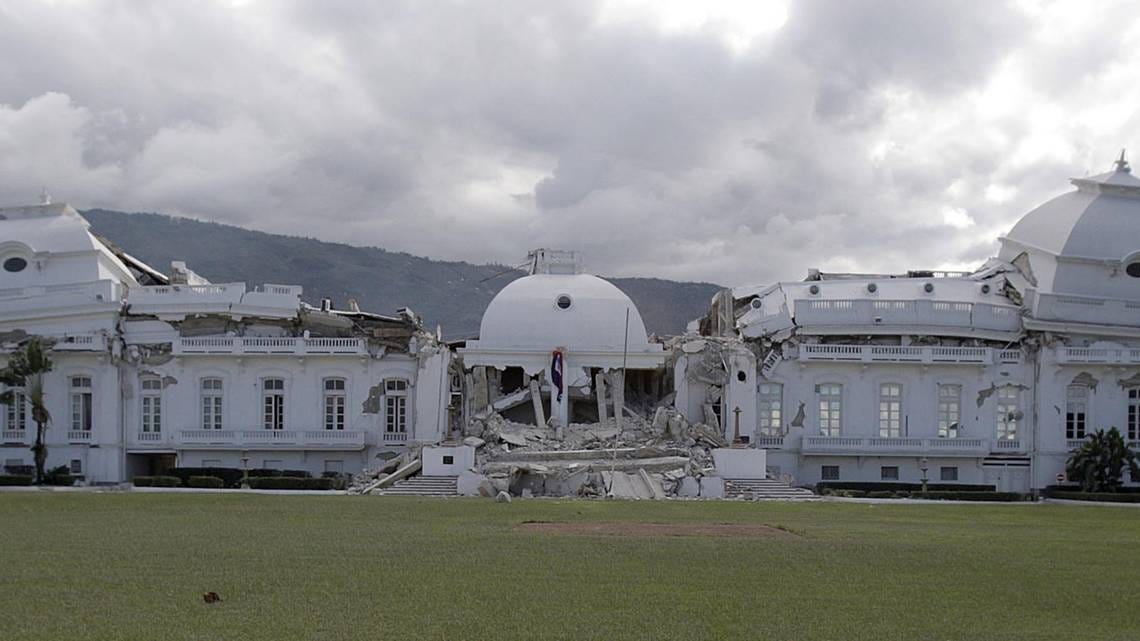
Haiti’s long-delayed transitional presidential council swore in earlier today — in a secret ceremony in the country’s besieged National Palace.
The “early morning ceremony was cloaked in secrecy and was not publicly announced because of the threat of violence. On the eve of the event, reports suggested it would take place in another government property, a mansion on the outskirts of town,” reports the Guardian.
Prime Minister Ariel Henry resigned yesterday, in a letter signed in Los Angeles and released today. The nine-member council, of which seven have voting powers, will appoint a prime minister and is also expected to help set the agenda of a new Cabinet. It will also appoint a provisional electoral commission, a requirement before elections can take place, and establish a national security council. Its mandate will extend until February 2026. (Associated Press)
Though there is no official list of candidates to head the new government, prospective candidates include former government ministers, jurists and retired technocrats who worked at international financing institutions, reports the Miami Herald.
Complications regarding the location of the ceremony are telling of the depth of Haiti’s multi-dimensional crisis. Some members of the transitional council pushed to swear-in at the National Palace, hoping to symbolize the return of government control after more than a month of anarchy. But the palace, never rebuilt after the 2010 earthquake and empty since President Jovenel Moïse was assassinated there three years ago, is surrounded by gangs who battle for territorial control in the area. (Associated Press)
A delegation visiting the site on Monday encountered “broken toilets, water leaks, walls pocked with bullet holes and bullet casings on the floor were among the discoveries as the group inspected the setting and tried to stay clear of flying bullets from gangs that regularly fire at the building,” reports the Miami Herald.
The new caretaker government faces steep challenges: “It is impossible to overstate the increase in gang activity across Port-au-Prince and beyond, the deterioration of the human rights situation and the deepening of the humanitarian crisis,” María Isabel Salvador, the U.N. special envoy for Haiti, said at a U.N. Security Council meeting on Monday.
“Whether or not you’re installed, this message is for you: Brace yourselves,” gang leader Jimmy “Barbeque” Cherizier warned in a Tuesday video shared on social media. (Reuters)
Regional Relations
Argentine jet fuel providers refused to service Cuban state airline Cubana this week citing concerns over U.S. trade sanctions on Cuba. The move created multiple unexpected flight cancellations. Argentina’s stance remained unclear, as there were no official government communications, President Javier Milei has sought to totally align Argentina’s foreign policy with U.S. objectives. U.S. sanctions against Cuba have been in place for 60 years, but Cubana regularly flies to Buenos Aires and other destinations, such as Madrid, without running into trouble refueling. (Reuters, Página 12)
Diplomatic tensions in Latin America, related to Ecuador’s raid on Mexico’s Quito embassy and uncertainty over Venezuela’s upcoming election, have divided the region and killed enthusiasm for a summit that Brazilian President Luiz Inácio Lula da Silva is trying to convene as a follow up to the “Brasilia Consensus” last year, reports Reuters.
The world’s 3,000 billionaires should pay a minimum 2% tax on their fast-growing wealth to raise £250bn a year for the global fight against poverty, inequality and global heating, write the finance ministers of Brazil, Spain, Germany and South Africa in the Guardian.
Brazil, which is hosting the G20 this year, put the proposal on the agenda. The French economist Daniel Zucman is now fleshing out the technical details of a plan that will again be discussed by the G20 in June. (Guardian)
“The argument behind such tax is straightforward: we need to enhance the ability of our tax systems to fulfil the principle of fairness, such that contributions are in line with the capacity to pay. Persisting loopholes in the system imply that high-net-worth individuals can minimise their income taxes.” (Guardian)
Brazil
A Brazilian Indigenous group said its members detained 12 people for allegedly mining illegally in the Amazon and handed them over to police, reports the Associated Press.
Barbados
Barbados Prime Minister Mia Mottley halted plans for British Conservative MP Richard Drax to receive £3 million for the purchase of 53 acres of the Drax Hall plantation, which he owns. Critics argue this land, historically tied to slavery, should be used for reparations rather than benefiting Drax financially. The government plans to develop the land into housing for low- and middle-income families, framing the purchase as unrelated to reparations but necessary to meet housing demands. (The Guardian, The Guardian)
Regional
More than 60 international delegations, including experts on human rights and climate change and from academia and non-governmental organizations, are participating in the session, hosted by the government of Barbados. (Miami Herald)
Portugal’s president said the country needs to “pay the costs” of slavery and other colonial-era crimes, “a rare instance of a European leader seemingly backing the need for reparations”, reports the Guardian.
Colombia
The El Niño related drought in Colombia is challenging President Gustavo Petro’s aspirations to transition to green energy, reports El País.
Venezuela
Venezuela’s government has repeatedly broken its promise to provide vaccines against HPV for free, and many public-school teachers ignore the requirement to teach sex ed, reports the Associated Press.




